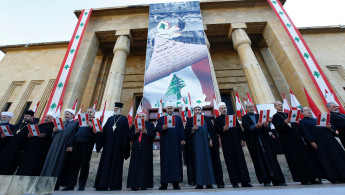Turning the page: Lebanon commemorates anniversary of civil war
Lebanese newspapers also published front-page appeals on Wednesday for readers to “turn the page” on sectarian divisions that persist more than four decades after the outbreak of the war.
"This painful anniversary is a moment to remember the innocent victims of the war and to stand in solidarity with the disabled, and we reiterate our demand to know what the fate of those who went missing is," Future Movement leader Saad Hariri said on Twitter, in quotes translated by The Daily Star.
“April 13: turn the page,” read the boldface headline on the front page of Wednesday’s French-language Lebanese daily L’Orient Le Jour.
Skirmishes had become commonplace prior to the start of the war, but an attack by Phalangist militiamen on a bus carrying Palestinians in the Beirut suburb of Ain al-Rummaneh on that day in 1975 sparked the war.
 |
Although the conflict officially ended in 1990 with the Taif Accord, Lebanon remained plagued by instability, corruption, and bitterly divided political factions |  |
"The Lebanese are therefore called to turn the page on conflicts and internal strife, not to fall into denial ... but to adopt an approach based on reconciliation," the newspaper wrote.
At least 150,000 people are estimated to have been killed, and at least one million people left the country.
Lebanon’s also war ravaged the country and left 17,000 people missing, but an amnesty allowed many of its key protagonists to subsequently become leading political figures.
Continued rivalries among those figures have paralysed government institutions: Lebanon’s parliament has twice extended its own mandate and the presidency has been vacant for nearly two years.
Above a composite picture depicting iconic Lebanese landmarks, cultural events, and ski slopes, al Nahar also asked its readers on Wednesday to “turn the page”.
"You’re fragmented and sectarian. You think of your Lebanon... your religious sect, your interests. So how can you say that you want to turn the page?" read its editorial section.
And al Mustaqbal encouraged its Lebanese readers to "turn the page again. Let’s build a nation of love and peace."
 |
Turn over the page of war, violence, strife, corruption and injustice... Open the page of the state, justice, partnership righteousness and the truth - Interior Minister Nouhad Machnouk |
 |
Al Safir daily, which faces possible closure due to funding challenges, published the same headline alongside a story about Lebanese women whose sons went missing during the war.
"Turn over the page of war, violence, strife, corruption and injustice... Open the page of the state, justice, partnership righteousness and the truth," Interior Minister Nouhad Machnouk said.
The Taif Accord, a national reconciliation agreement which was signed by Lebanese warring factions in Saudi Arabia, put an end to the war, dissolving or weakening most militias and giving more power to Syria in Lebanon.
The Syrian army withdrew from Lebanon in 2005 after being present in the country since 1976, while Israel, which occupied a part of southern Lebanon since 1982, withdrew in 2000 under pressure from Hizballah attacks.
See Lebanon civil war picture album





 Follow the Middle East's top stories in English at The New Arab on Google News
Follow the Middle East's top stories in English at The New Arab on Google News
![The UAE is widely suspected of arming the RSF militia [Getty]](/sites/default/files/styles/image_330x185/public/2024-11/GettyImages-472529908.jpg?h=69f2b9d0&itok=Yauw3YTG)
![Netanyahu furiously denounced the ICC [Getty]](/sites/default/files/styles/image_330x185/public/2024-11/GettyImages-2169352575.jpg?h=199d8c1f&itok=-vRiruf5)
![Both Hamas and the Palestinian Authority welcomed the ICC arrest warrants [Getty]](/sites/default/files/styles/image_330x185/public/2024-11/GettyImages-2178351173.jpg?h=199d8c1f&itok=TV858iVg)